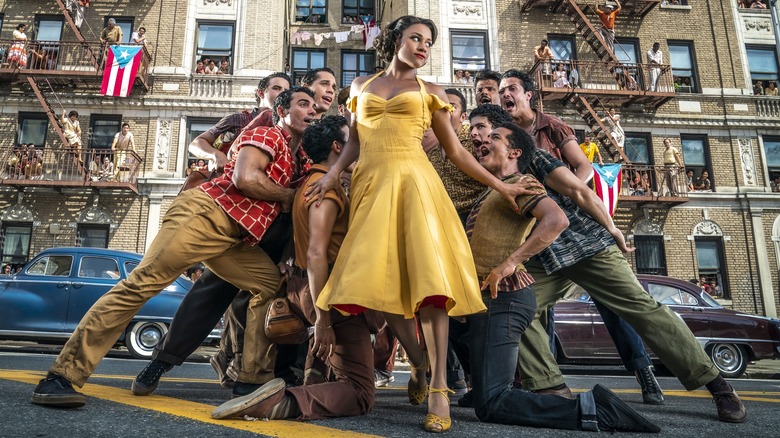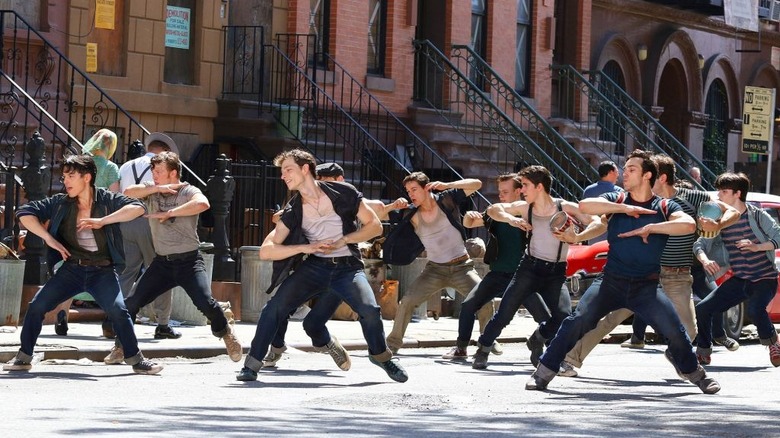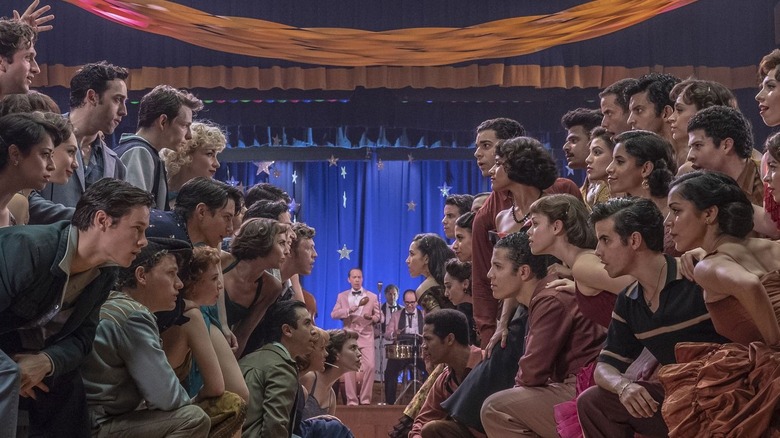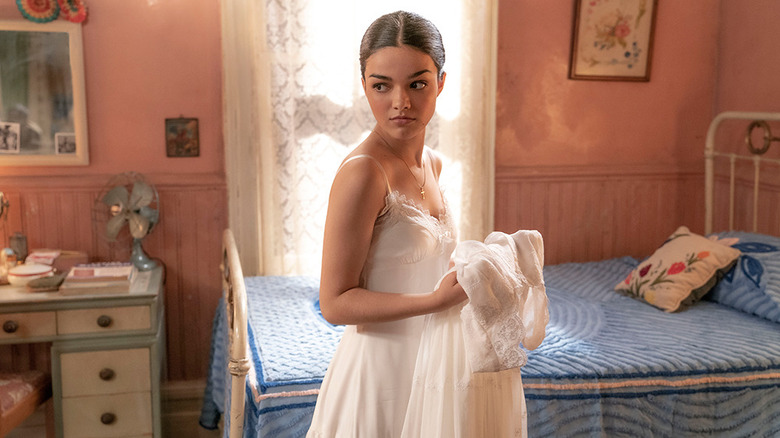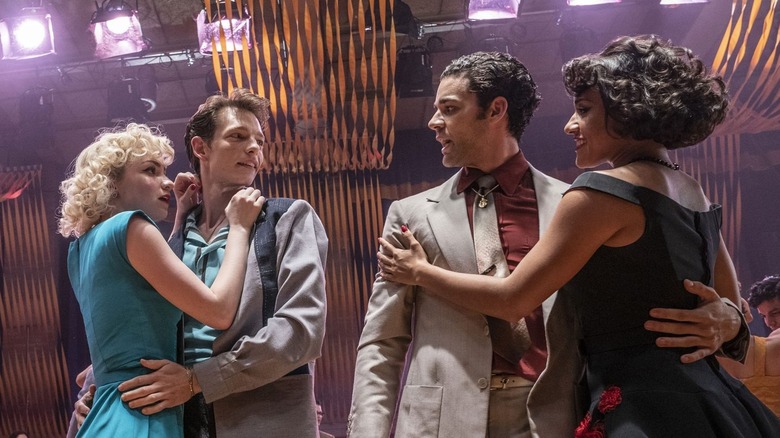West Side Story History Lessons From Music Producer David Newman [Interview]
It's almost as if destiny brought composer David Newman to Steven Spielberg's "West Side Story." Newman, who composed "Anastasia," "Galaxy Quest," and Danny DeVito's films, first worked on "West Side Story" as a teenager. Since then, the Broadway show and the 1961 film adaptation have been a major part of his career and life. When the time came to work on Spielberg's film as a music producer and score arranger, he was more than ready for the mammoth task.
During a wide-ranging interview about the film, Newman proved himself as a real Bernstein and "West Side Story" historian. Newman's passion for the show, as well as its creators, was infectious. He knows the music inside out. Recently, the composer talked with us about his history with, knowledge of, and love for "West Side Story."
"It gets better every generation."
You first worked on "West Side Story" in the 11th grade, so it seems like your life has been building towards this movie for a long time.
I did. "West Side Story" has always been a big part of my life. Where I grew up, it was a big deal, high school musicals. We went to large public high schools in the late '60s, early '70s. There were a lot of talented kids. It's the west side of Los Angeles, a lot of industry people live there. You'd rehearse for three months. I really learned it that year when I was probably 14, 15 years old. I'd listened to the Broadway cast album with my father and I knew it really well, but rehearsing it for three months, I really got to know it.
And I was a music director. We had a little semi-pro theater company in Los Angeles in my 20s for about six summers. We would do one show a year. We'd rehearse. It was a lot of amateurs and then a few professionals, but the orchestras were always professional orchestras. One of those years we did "West Side Story," so I got to look at it from that point of view, from conducting and being the music director. And then, I've been doing the 1961 movie starting in 2011, [conducting along with] the film with live orchestra, which I've done probably 40 times. So, I'm pretty familiar with "West Side Story."
I'm sure there are a lot of major and subtle differences, but working on the music with a live orchestra versus for a film, how's it different for you? What are the different demands?
Well, it's different. The idea of the music is not to change it or update it or re-orchestrate it, but of course, there are things that we needed to do because of the peculiarity of filming it. Plus, he really made a film out of it. My feeling is he made a film out of it, and it's not a filmed play or show. So there are things that need the film syntax, the way you do films that we need to do with the music. You just pull it from one of four sources that we had for "West Side Story" — mainly the Broadway show, but some from the movie. Some from the Symphonic Dances that Bernstein arranged in 1961, which is now part of the orchestra canon, and then his kind of update of the Broadway show in 1988, when he did that CD with the opera singers, with José Carreras and Kiri Te Kanawa, et cetera. So he had all those four things, and I just know where everything is. Most people haven't seen the Broadway show. Most people's introduction to "West Side Story" was the '61 movie. There's quite a bit of beautiful music that's not in that '61 film. There's a lot of incidental music, which we were able to draw on to do underscore cues given what Spielberg needed.
We also put in things that weren't in the movie. There's a little scene where, right after "Tonight" as Maria's waking up the next morning, that piece is from the Broadway show, which was then in the Symphonic Dances, but it's not in the [original] movie. So that might feel unfamiliar to people, but that's in the ballet from the Broadway show.
What were some of the other changes you had to make to accommodate what a film demands?
In the show, the prologue's very short. In the movie, the '61 movie, it's longer, maybe it's a little more bloated. The authors were not big fans of the '61 movie, which is one of the reasons this got made even in the first place. We used more of the pitched atmospheric drums, but there's stuff in the prologue that's not in any of my arrangement. I did an arrangement of "Somewhere" that Rita [Moreno] sings, that's new, but it's all Bernstein music there.
I'm not an arranger or an orchestrator, I'm a film composer. I write an orchestration for myself. I don't do it for other people. I don't arrange songs for singers or anything like that. But this is a very peculiar thing because it's so canonical, the piece. It's so part of our culture. You have to be really careful and really know what you're doing to do this, to be able to know what Stephen [Sondheim] will want, and what Spielberg will want. It's my job to go and figure out where to find it so that it's Bernstein. None of us that are in the music portion of this wanted to insert ourselves into this. This is all for the good of "West Side Story," if that makes any sense.
It's a very unique piece of art, so we were careful with the music. Of course, we wanted to make it sound as great as possible. I humbly think that our recording of it is the best one that's out there presently. That's an update, because it's been 60 years since they recorded in '61. Lots of new technology. And also, the players know the music really well now. It was much harder for them to play the music in '61 because it was newer. Now anybody can — high school orchestras almost can play this, and certainly college level orchestras, because of the state of orchestra playing, like athletes. It gets better every generation.
"The north star was the Broadway show."
The complexity of "West Side Story," as you mentioned, is that it means so many different things to people. How do you take into account varying expectations?
Well, this is the point, is that we didn't want to remake it, reimagine it, re-orchestrate it, update it in terms of the music. It would've been a huge mistake, in my opinion, to do that. So yes, we did do a different arrangement of "Somewhere," but there's an intellectual precedent for that because in the Broadway show — "Somewhere" and "Maria” are probably the most covered well-known songs from "West Side Story," I would say. "Somewhere" in the Broadway show, is in the middle of the ballet sung by a woman offstage. It's a disembodied voice while Maria and Tony dance and do Jerome Robin's choreography. In the movie, it's Tony and Maria singing a duet. It's completely different in the movie than what it does in the theater. So we felt, "Okay, this is part of the script" and everything. We messed around a little bit. Steven wanted Rita to do it a cappella with no accompaniment at all, but then I made an arrangement.
We kicked it around a bit and we landed where we landed. So, she does the beginning of it with very little accompaniment and then the orchestra comes in as it is orchestrated in the Broadway show. And then she does the last note a cappella again by herself. It had an arc where it builds a little bit in the middle and then builds to the end and then it fades away. And it's the same arc as the song. It's not a different song, it's just a different way of setting it.
Every other thing that we did, with the exception of one or two things, was pulled from something that already existed. There is a perception out there, and the more people I talk to, the more I hear, "Why are you doing this? Why remake this?" When you sit down and see the movie, you understand. It's hard to explain, but I think part of the success of that work is that the music is the music. It's the 1957 Bernstein score to the show, "West Side Story." Even though we had to do a few things here and there, it's still all that. Whatever we did, we tried to smooth out, hide, not let the audience know there was something weird going on. It's the opposite of what you normally would do to update a musical.
So my father did all the Rodgers and Hammerstein music at Fox. My father was Alfred Newman, he was the music director at Fox for 20 years. He wrote the Fox logo that goes in front of "Star Wars." All those musicals were greatly re-orchestrated. The '61 movie, "West Side Story," was as well, but it was done by Sid Ramin and Irwin Kostal, who orchestrated the original. So we didn't use much of the movie, but we were able to because it's authentic and original, because the guys that did it were the guys that did the show. The north star was the Broadway show. That's where we kept coming back to.
Whatever Spielberg needed, it was our job to give it to him. We did a lot of pre-recording so they could dance to it. And then they'd go and edit and they add something or cut something. It's not an arrangement, it's not an orchestration, it's just a kind of unique thing. And it turned out for me, I would never do anything else besides "West Side Story” like this, ever. It just wouldn't be in my wheelhouse. But this is my wheelhouse because I know it so well. I know where to go to look. If I have to sort of interpolate something, I can kind of channel Bernstein a bit. And there's a lot of people weighing in on it, anyway, so you have to show it to a lot of people and it clarifies what's going to work and not work.
Sondheim famously wasn't fond of "I Feel Pretty," so what was it like working on a song he himself didn't feel good about?
Well, they toyed with not putting "I Feel Pretty" in the movie. You have to put it in. The thing about movies is you can say, "Yeah, let's do this." And then at some point you just realize that you're not totally in charge of the movie, the movie's kind of in charge of itself. It needs what it needs. It needs "I Feel Pretty," it needs it for a breath wherever you place it.
In the Broadway show, "I Feel Pretty" opens the second act. So the end of the first act is the rumble and the death of Riff and Bernardo. And the beginning of Act Two is "I Feel Pretty." Well, guess why it's there? It's there for relief. Also, "Krupke" is in Act Two of the Broadway show. Again, it's so intense, the first act, it just structurally needs it. And that's why they put the ballet in because it's so short, the second act. When you get all the way to the rumble in the movie, you're almost done with the movie.
I guess they could have cut "I Feel Pretty." Yeah, I know Sondheim doesn't like a lot of it. Sondheim was the young person involved in this at the time. Bernstein and Robbins and Arthur Lawrence were just huge in New York. Can you imagine how intimidating that must be? Sondheim is a genius. I loved Sondheim. I'm so glad he got to live in that environment. I'm sure that affected him for the rest of his life, being around those people, and all the fantastic stuff he did in his life. I put his stuff up there with anything. I think "West Side Story" is sort of a one off, but the Sondheim, you can study it, and it gives you back so much. He was a young person then, and I don't think he was totally into it.
I think Bernstein wrote "Maria, Maria, I just met a girl named Maria." So he had to use that, I think. I know that Sondheim wanted initially the men and the women to sing in "America," which is what they eventually did in the movie. And of course, we did as well. That was a fix that Sondheim liked about the movie.
Did you have many interactions with Sondheim?
My brother Tom was very close with Sondheim. My brother, Thomas Newman, who's a great film composer. He's been nominated 13 times. I think I met him once. I met Jonathan Tunick [who orchestrated Sondheim's work] a few times. Sondheim really was more focused on the vocals and the screenplay in this. He really wasn't all that involved in the music, in my part of the music. Obviously, he was with the vocals. That's another thing I love. I love how well the harmony in "America" starts. Also, in "I Feel Pretty," I love all of the three part harmony, which I've never heard. Even on Broadway, they can't do it. It's awesome. I love that. I would really miss "I Feel Pretty" if it wasn't there.
"95% of it is just from the Broadway show."
You've also talked about preserving the timelessness of the music. On a technical level, how did you do that?
Well, the most salient thing about "West Side Story” is that first, [Bernstein is] an American composer. He was the most famous musician arguably of his time, that he was American is just completely unique, that he was that famous and American. He was a composer, a conductor and a just wonderful educator, wonderful on TV. He was a nice looking man. He was the whole package, like a Renaissance man. He wrote "West Side Story" very early on. He had written, I think, "On the Town" before. He had done a film score, "On the Waterfront," the Kazan film. But "West Side Story” really is his most known, probably beloved work.
But when you look at "West Side Story," it's just a melange of different styles. You've got broke counterpoint, you have Renaissance counterpoint, you have Latin jazz, you have bebop, you have jazz, swing jazz, you have opera. You have all these things mashed together. It's the very definition of eclectic, and yet it does not sound eclectic. It's all based on an interval that's called an augmented fourth. It's the middle note in the 12 notes scale.
It's an actual, almost narrative interval, in the sense that in the medieval period and Renaissance period as Western music developed, it was almost a sin to use that because most of the music was in church, in sacred context. And it was a sin to use that interval. It's the interval of the devil. But it's also based on a shofar call, the call to Jewish worship, the kind of horn that they use, which sometimes it's a perfect fourth. So an augmented fourth, it's like a sharp perfect fourth.
It's intellectually interesting and indescribably beautiful. The melodies are beautiful, but they're very leapy. They're not typical melodies. They're hard to sing and there's a fugue in the middle of "Cool" in this dance. This kind of jazz dance, the whole middle of it is basically an exposition of a fugue. And what the hell's that doing there? And then the quintet where the Jets start. There's five parts, the Jets do something, Sharks do something, Maria does something, Tony does something, and Anita does something. And then they all sing together in counterpoint, which is what I'm referring to as Renaissance counterpoint. I can't think of a show that does that, a Broadway show.
And then he writes the "Symphonic Dances" in 1961, so that's four years after the show. And it's a piece, and as I said, in the canon. The musical canon, maybe 1750 to now, in almost 300 years, there are millions and millions of pieces of music written. There are maybe 500 that are played over and over again. "West Side Story" is one of them, the "Symphonic Dances." You have to be really careful with something like that. It's not like updating, God love it, "In the Heights" or a lot of these musicals, or what they did to the "Dear Evan Hanson," whether you liked it or not.
It's just not a good idea to do it. It's not where you can make your mark, what Spielberg and Tony Kushner were trying to do. They're just trying to clarify the story, make the story clear, make the motivation clear, make the cast younger, make the cast more authentic, make the language more authentic, Spanish, no subtitles. When you're in their house, Anita's house or Maria's house, that's how they talk, and we don't understand what they're saying. If you don't understand Spanish, you don't understand what they're saying, but you get it. It's not like you don't get it.
So that's the stuff that without the music being solidly in the context of when Bernstein wrote it, anything that deviates is scrupulously vetted and intellectually sound and viscerally doesn't take the viewer to some other weirdo place. That's what we needed to do. Then they can go farther afield in the screenplay aspect and the way they set the songs. The choreography's a little different, but it's not that different. It's more muscular, it's more musical, it's better for those actors. It's choreographed specifically for who was cast. The Jerome Robbins choreography, you have to do it if you rent the show, the Broadway show.
But none of the choreography looked to me like it was not — it looked like Jerome Robbins to me, just a little different. In other words, it didn't go that far off the reservation. The farthest we went on was the screenplay, the way some of the songs were set. One thing we did do, we sneaked into some of the songs rather than just banging in. "Krupke" has a different beginning now. There's a little cue that goes into "A Boy Like That." I just pulled something from the song or from something else, but 95% of it is just from the Broadway show, really.
"West Side Story is his, to me, crowning glory."
The way you describe the music, this melting pot of different influences that still makes for a singular sound and vision, why do you think those different genres come together as well as they do in "West Side Story"?
It reminds me of The Beatles, of all things. I was not a big fan of The Beatles. The great composer, Johann Sebastian Bach, at the end of his life, he wrote these couple of pieces, "Mass in B Minor," "The Art of the Fugue," maybe a couple other things where he took every form he knew, every dance form, every secular form, every sacred form, and made pieces out of it. He took everything that was in the world of Western art at that time and mashed it into a piece, and still all sounds like Bach. It's the same thing like Bernstein.
And The Beatles, to me, took everything. They took classical music, they took Penderecki, modern classical music, they took vaudeville. They took world music and mashed it into these albums. And whenever you hear a Beatles song it, you don't hear that. When you listen to "West Side Story," you don't hear [that collision of influences], either. If you study it and you go over it enough, you can certainly find a reference, but it's not the original place that one viscerally goes. It just sounds like him. He was that kind of artist, I think. He loved everything. He loved jazz, he loved popular music, he loved classical music.
He wasn't one of these guys that hated pop music and thought film music was horrible and it's only this and screw everybody else. He was a polyglot. He loved everything. And he was so charismatic. It's almost a shame because he was such a talented conductor. It's so enticing. What's the right word? It's so much fun to go around the world and conduct and have people clap for you. Nobody's clapping for you when you're writing music by yourself, there's no applause. And at the end of "West Side Story," generally, you don't get up on stage. If it's a certain kind of situation, you might, but there's no applause for you in a Broadway show normally. It's just the actors bow and that's it, the composer isn't there.
But conducting, everyone's clapping, they're paying for lunch and dinner and you have access to all these interesting people and you get to travel around the world and you're making tons of money and everything. And then you come back home to write and it's just like, I think he'd said it took him weeks to even start writing anything even when he mapped out the time. I just think he was so good at so many things, it's almost a shame that he wasn't maybe less good at some of this stuff so that he could have spent more time composing.
He was a product of his time. He wrote symphonies. Some of the stuff he wrote is still sort of eclectic like "West Side Story," but a lot of it is him struggling with that era and modern classical music, which is a very difficult era to write your own music in. After World War II, everything serialized. It's a way of formalizing music where you repeat these things over and over. Not just notes, but dynamics and articulations. It gets to be insane. It's so crazy. You could never really follow it. It didn't really spawn much of anything, but that's when he was working and composing.
This is just my opinion. "West Side Story" is his, to me, crowning glory. Not that other stuff he wrote isn't great. And especially revisiting it, and that Spielberg was able to make a movie like this, it just speaks to the quality of the music, really. It's so good, the music, that you can do this. You can make another movie and it doesn't feel like you've had to completely change at all to make it work, hence my analogy to an opera production.
"West Side Story" is now in theaters.
